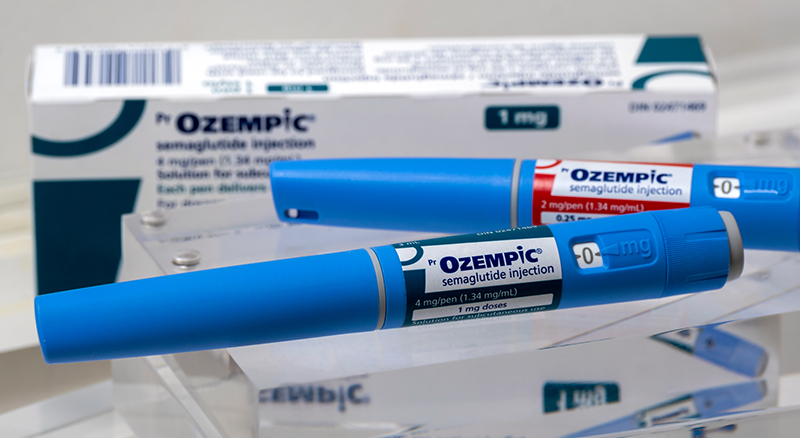There are legal actions being taken for gastroparesis/stomach paralysis after use of diabetic drugs Ozempic, Wegovy, Rybelsus, Saxenda, Mounjaro, and Trulicity for weight loss.
Drugs that are intended for a medical condition are being re-positioned as weight-loss drugs without patients fully understanding the risks involved. Read more to see if this applies to you and seek legal action if you or anyone you know has been affected.
CNN reported many of the problems some users of these diabetes drugs have experienced, and further reported that doctors are coming forward with reports of gastroparesis by patients who took these medications.
Notably, many doctors prescribing these drugs own and/or operate weight-loss clinics. The FDA has received adverse event reports of gastroparesis/stomach paralysis from individuals who took these drugs.
What You Need to Know About Ozempic, Wegovy, Rybelsus, Saxenda, Mounjaro & Trulicity
Ozempic, Wegovy, Rybelsus, Mounjaro, and Trulicity belong to a class of drugs called glucagon-like peptide-1 receptor agonists (GLP-1 RA). All three drugs share the same common active ingredient: semaglutide.
Patients receive some drugs, like Ozempic and Wegovy, as subcutaneous injections. The key difference between the two drugs is that Ozempic is designed for treatment of type 2 diabetes at doses of 0.5 to 1 mg weekly, while Wegovy has been FDA-approved as a weight loss drug with a weekly dosage of 2.4 mg.
Like Ozempic, Rybelsus is designed to treat type 2 diabetes mellitus, but the patient takes this medication daily in the form of an oral tablet.
Stomach Paralysis Lawsuit
“Gastroparesis” is a medical condition in which the patient’s stomach does not empty properly. The manufacturers of these weight-loss drugs don’t include proper warnings about the increased risk of gastroparesis/stomach paralysis for people who consume the medications or receive GLP-1 RA treatments.
The first GLP-1 RA drug lawsuit filed involved a woman who began receiving Ozempic injections in spring 2022. According to the plaintiff, within two years she was suffering from severe stomach paralysis. Switching to another medication, Mounjaro, did not alleviate her symptoms.
Approximately 20 more lawsuits have been filed against Novo Nordisk and Eli Lilly as shown in court records.
Stomach Paralysis Lawsuit Timeline
- 2012: Novo Nordisk researchers develop semaglutide as a diabetes therapy.
- 2016: Clinical trials of Ozempic begin.
- 2016: FDA New Drug Application filed.
- 2017: Clinical trials of Ozempic completed (May).
- 2017: Ozempic approved by the FDA (December) as an injectable form of semaglutide to improve glycemic control in adults with type 2 diabetes mellitus.
- 2017: University of Leeds researchers and Novo Nordisk report semaglutide can be used to treat obesity.
- 2018: Ozempic approved in European Union, Japan, and Canada.
- 2019: Novo Nordisk’s Rybelsus (oral form of semaglutide) approved for medical use in U.S.
- 2020: Rybelsus approved for medical use in European Union.
- 2021: FDA approves Wegovy, Novo Nordisk’s semaglutide injection for long-term weight management in adults.
- 2021: More than 10,000 semaglutide-related adverse events are reported to the FDA Adverse Reporting System (FAERS).
- 2023: Ozempic and Wegovy are listed on FDA’s Drug Shortages list.
- 2023: Lawsuits initiated against Novo Nordisk by patients who developed gastroparesis.
- 2024: MDL likely
Criteria to File Stomach Paralysis Lawsuit
We are currently investigating cases on behalf of individuals who received Ozempic, Rybelsus, Wegovy, Mounjaro, or Trulicity branded GLP-1 RA treatments (in pills or via injections) and:
- At time of injury, 69 years old or younger
- Received a diagnosis of gastroparesis, stomach paralysis, or gastric obstruction while taking these drugs within 30 days of stopping use
- Required an emergency room visit or hospital admission
- No prior medical history of gastroparesis, stomach paralysis, or gastric obstruction
Complications from Gastroparesis
The National Institute of Diabetes and Digestive and Kidney Diseases lists a range of complications that can arise from gastroparesis:
- Dehydration from repeated vomiting
- Malnutrition from poor nutrition absorption
- Difficulty controlling blood sugar levels
- Low-calorie intake
- Bezoars - a solid chunk of food in stomach preventing digestion, which can cause ulcers and internal bleeding
- Decreased quality of life
There is no cure for gastroparesis. Treatments for the condition appear to offer only temporary benefits, according to MedlinePlus, the authoritative source that gathers health information from the National Library of Medicine (NLM), the National Institutes of Health (NIH), and other government agencies and health-related organizations.
Bart Durham Injury Law is Here to Help
Give Bart Durham Injury Law a call right now – 800-844-1712 – to discuss your potential case.
Consultations are always FREE, and the Bart Durham Injury Law team has years of experience helping folks just like you get the justice and compensation they deserve.



